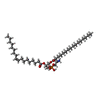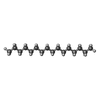+ Open data
Open data
- Basic information
Basic information
| Entry | Database: PDB / ID: 6uzy | ||||||
|---|---|---|---|---|---|---|---|
| Title | Cryo-EM structure of Xenopus tropicalis pannexin 1 | ||||||
 Components Components | Pannexin | ||||||
 Keywords Keywords |  MEMBRANE PROTEIN / MEMBRANE PROTEIN /  ion channel / ion channel /  pannexin 1 pannexin 1 | ||||||
| Function / homology |  Function and homology information Function and homology informationpositive regulation of interleukin-1 production /  gap junction / channel activity / monoatomic cation transport / identical protein binding / gap junction / channel activity / monoatomic cation transport / identical protein binding /  plasma membrane plasma membraneSimilarity search - Function | ||||||
| Biological species |  Xenopus tropicalis (tropical clawed frog) Xenopus tropicalis (tropical clawed frog) | ||||||
| Method |  ELECTRON MICROSCOPY / ELECTRON MICROSCOPY /  single particle reconstruction / single particle reconstruction /  cryo EM / Resolution: 3.38 Å cryo EM / Resolution: 3.38 Å | ||||||
 Authors Authors | Deng, Z. / He, Z. / Yuan, P. | ||||||
 Citation Citation |  Journal: Nat Struct Mol Biol / Year: 2020 Journal: Nat Struct Mol Biol / Year: 2020Title: Cryo-EM structures of the ATP release channel pannexin 1. Authors: Zengqin Deng / Zhihui He / Grigory Maksaev / Ryan M Bitter / Michael Rau / James A J Fitzpatrick / Peng Yuan /  Abstract: The plasma membrane adenosine triphosphate (ATP) release channel pannexin 1 (PANX1) has been implicated in many physiological and pathophysiological processes associated with purinergic signaling, ...The plasma membrane adenosine triphosphate (ATP) release channel pannexin 1 (PANX1) has been implicated in many physiological and pathophysiological processes associated with purinergic signaling, including cancer progression, apoptotic cell clearance, inflammation, blood pressure regulation, oocyte development, epilepsy and neuropathic pain. Here we present near-atomic-resolution structures of human and frog PANX1 determined by cryo-electron microscopy that revealed a heptameric channel architecture. Compatible with ATP permeation, the transmembrane pore and cytoplasmic vestibule were exceptionally wide. An extracellular tryptophan ring located at the outer pore created a constriction site, potentially functioning as a molecular sieve that restricts the size of permeable substrates. The amino and carboxyl termini, not resolved in the density map, appeared to be structurally dynamic and might contribute to narrowing of the pore during channel gating. In combination with functional characterization, this work elucidates the previously unknown architecture of pannexin channels and establishes a foundation for understanding their unique channel properties. | ||||||
| History |
|
- Structure visualization
Structure visualization
| Movie |
 Movie viewer Movie viewer |
|---|---|
| Structure viewer | Molecule:  Molmil Molmil Jmol/JSmol Jmol/JSmol |
- Downloads & links
Downloads & links
- Download
Download
| PDBx/mmCIF format |  6uzy.cif.gz 6uzy.cif.gz | 359.8 KB | Display |  PDBx/mmCIF format PDBx/mmCIF format |
|---|---|---|---|---|
| PDB format |  pdb6uzy.ent.gz pdb6uzy.ent.gz | 302.1 KB | Display |  PDB format PDB format |
| PDBx/mmJSON format |  6uzy.json.gz 6uzy.json.gz | Tree view |  PDBx/mmJSON format PDBx/mmJSON format | |
| Others |  Other downloads Other downloads |
-Validation report
| Arichive directory |  https://data.pdbj.org/pub/pdb/validation_reports/uz/6uzy https://data.pdbj.org/pub/pdb/validation_reports/uz/6uzy ftp://data.pdbj.org/pub/pdb/validation_reports/uz/6uzy ftp://data.pdbj.org/pub/pdb/validation_reports/uz/6uzy | HTTPS FTP |
|---|
-Related structure data
| Related structure data |  20964MC  6v6dC M: map data used to model this data C: citing same article ( |
|---|---|
| Similar structure data |
- Links
Links
- Assembly
Assembly
| Deposited unit | 
|
|---|---|
| 1 |
|
- Components
Components
| #1: Protein |  Mass: 49735.441 Da / Num. of mol.: 7 Source method: isolated from a genetically manipulated source Source: (gene. exp.)  Xenopus tropicalis (tropical clawed frog) Xenopus tropicalis (tropical clawed frog)Gene: panx1, LOC100170473, PANX / Production host:   Komagataella pastoris (fungus) / References: UniProt: B3DLA5 Komagataella pastoris (fungus) / References: UniProt: B3DLA5#2: Chemical | ChemComp-6OU / [( #3: Chemical | ChemComp-R16 /  Hexadecane HexadecaneHas ligand of interest | Y | |
|---|
-Experimental details
-Experiment
| Experiment | Method:  ELECTRON MICROSCOPY ELECTRON MICROSCOPY |
|---|---|
| EM experiment | Aggregation state: PARTICLE / 3D reconstruction method:  single particle reconstruction single particle reconstruction |
- Sample preparation
Sample preparation
| Component | Name: xenopus pannexin 1 / Type: COMPLEX / Entity ID: #1 / Source: RECOMBINANT |
|---|---|
| Source (natural) | Organism:  Xenopus tropicalis (tropical clawed frog) Xenopus tropicalis (tropical clawed frog) |
| Source (recombinant) | Organism:   Komagataella pastoris (fungus) Komagataella pastoris (fungus) |
| Buffer solution | pH: 8 |
| Specimen | Conc.: 6 mg/ml / Embedding applied: NO / Shadowing applied: NO / Staining applied : NO / Vitrification applied : NO / Vitrification applied : YES : YES |
Vitrification | Cryogen name: ETHANE |
- Electron microscopy imaging
Electron microscopy imaging
| Experimental equipment |  Model: Titan Krios / Image courtesy: FEI Company |
|---|---|
| Microscopy | Model: FEI TITAN KRIOS |
| Electron gun | Electron source : :  FIELD EMISSION GUN / Accelerating voltage: 300 kV / Illumination mode: OTHER FIELD EMISSION GUN / Accelerating voltage: 300 kV / Illumination mode: OTHER |
| Electron lens | Mode: OTHER |
| Image recording | Electron dose: 62 e/Å2 / Film or detector model: GATAN K2 SUMMIT (4k x 4k) |
- Processing
Processing
CTF correction | Type: PHASE FLIPPING AND AMPLITUDE CORRECTION |
|---|---|
| Symmetry | Point symmetry : C7 (7 fold cyclic : C7 (7 fold cyclic ) ) |
3D reconstruction | Resolution: 3.38 Å / Resolution method: FSC 0.143 CUT-OFF / Num. of particles: 176371 / Symmetry type: POINT |
 Movie
Movie Controller
Controller







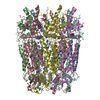


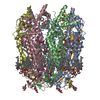
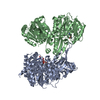
 PDBj
PDBj